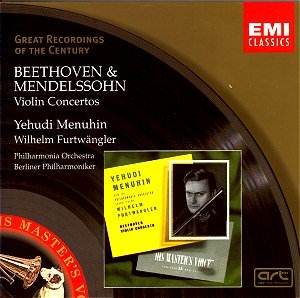To compare this Beethoven with Menuhin’s first
stereo remake, recorded under Constantin Silvestri in Vienna seven
years later, is to obtain a lesson on the fickleness of inspiration
and human frailty. Silvestri conducts more than ably, and the
tempo is practically the same both times, yet Menuhin is edgy,
nervous, and often plays sharp. Despite a few flexible corners
as he settles down Furtwängler offers a remarkably classical
reading of the orchestral exposition – far more so than Bruno
Walter in his recording with Szigeti – but somehow he gives the
idea that each new idea is born in that moment. Thereafter he
and Menuhin are as one, a true dialogue as the ideas pass between
them. The slow movement under Silvestri seems episodic; Furtwängler
and Menuhin create a seamless flow. I have never before appreciated
so much the continuity of this movement. Menuhin begins the finale
at a fairly serene dance tempo; his phrasing is a little more
legato than we usually hear, and Furtwängler picks this up
so as to give a completely unified effect while Silvestri phrases
the normal way. At the first episode Furtwängler speeds up,
but he turns out to be right. Silvestri carries on at the same
tempo and it becomes a plod, so when Menuhin enters he speeds
things up on his own account. Menuhin and Furtwängler play
as one man, and this movement, too, is the best integrated I have
ever heard.
Not surprisingly, Menuhin returned to the concerto
only a few years after the Silvestri recording, this time with
Klemperer. Later still he remade it with Kurt Masur, but in the
opinion of many his truly great Beethoven concerto recordings
are the two under Furtwängler, of which this is the second.
There are those who feel that the 1947 version is more inspired
still, but since the present one is in very good 1953 mono sound
it can safely be recommended to the general listener in search
of a deep musical experience.
The Mendelssohn is rather more shrill as a recording,
but never mind, the performance is fiery and passionate in the
first movement, surprisingly mobile in the second and sufficiently
steady in the last to allow all the counterpoint to come through
clearly; genuinely vivacious, not merely fast. Few performances
make you so aware of the stature of the composer and of the work.
And yet … Furtwängler was an inspirational
artist who always gave his best before an audience. In 1952 he
gave this concerto in Turin – preserved in the archives – with
the volatile artist Gioconda De Vito. For every thousand people
who have heard the name of Menuhin, you’d be lucky to meet one
who knows that of De Vito, but she was a great violinist, too,
more romantic than Menuhin with a vocal style of phrasing that
looks back to Kreisler. She obviously got on well with Furtwängler
since the archives also contain a marvellous Brahms concerto from
them. There is a freedom and poetry, if at times a wildness, to
their performance which makes the Menuhin sound a shade studio-bound.
Some of Furtwängler’s RAI performances are coming out on
CD from the Istituto Discografico Italiano, so perhaps this is
on the way.
All the same, the Menuhin/Furtwängler collaboration
was an important one and all the discs they did together deserve
to be called "great". If you don’t know these two performances,
they’ll probably leave you marvelling anew at the music itself.
Christopher Howell
